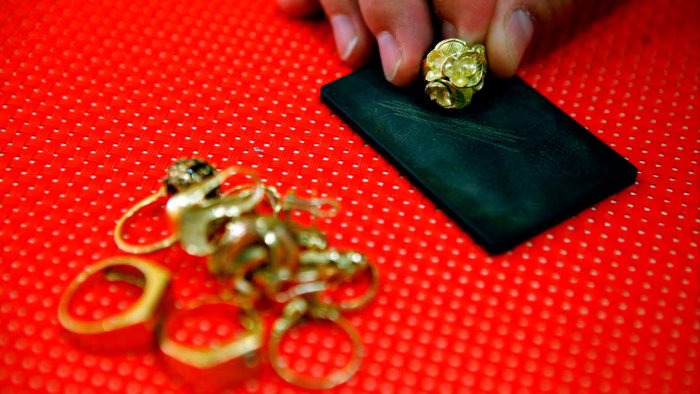Unlock the Editor’s Digest for free
Roula Khalaf, Editor of the FT, selects her favourite stories in this weekly newsletter.
Italian Prime Minister Giorgia Meloni’s government is looking to gold — and its soaring value — to raise more money for the public coffers, as members of her right-wing coalition squabble over other elements of next year’s budget.
Some lawmakers from the three-party governing coalition have proposed that the Italian exchequer could raise up to €2bn from a scheme to entice citizens who own undocumented gold coins, jewellery and bullion to declare their holdings, have it valued and pay a 12.5 per cent tax on its worth.
Many Italian families hold small stocks of gold that lack any proof of origin, as it is often inherited from parents and grandparents who traditionally saw the precious metal as safer than the lira, Italy’s currency before the euro. Traditionally, Italians have also given children and grandchildren small gifts of gold.
However, under current rules, they are discouraged from selling this gold through legal channels as they are required to pay a 26 per cent tax on the total value of the sale if they lack documents to prove the original purchase price.
Senator Dario Damiani, a member of Forza Italia and a backer of the proposal, said the programme aimed to “encourage the monetisation of gold held by Italians”.
A finance ministry official said the government was considering the scheme, although authorities were sceptical about how much it would raise. “It would be very difficult for this measure to deliver €2bn,” the spokesperson said.
The proposal from Forza Italia and the League lawmakers comes as the two parties object to plans to raise taxes on short-term, Airbnb-style rentals and some of the other revenue-raising measures in finance minister Giancarlo Giorgetti’s draft budget.
Critics said the gold proposal reflected a desperate hunt for funds to allow for other unpopular measures in the budget to be scrapped and to finance a tax cut for the middle classes.
“This government doesn’t know where to get money,” said Gianmauro Dell’Olio, a parliament member from the opposition Five Star party, and the vice-president of the parliament’s budget commission.
The scheme — which lawmakers suggest could run in the first half of 2026 — would allow holders of undocumented gold to obtain legal documentation. In the event of a future sale, this would enable them to pay a 26 per cent capital gains tax solely on any profit from the sale.
“You can reduce the tax burden for a future sale with this revaluation,” said Sergio Finulli, a chartered accountant at Milan-based Sofiae. “It makes sense. People have to think about it — and the cost.”
But Dell’Olio said people are unlikely to participate in the scheme at a time when gold is trading above $4,300 per troy ounce in view of a sale in the distant future.
“I don’t think people will go start weighing necklaces that their grandmother or grandfather gave them,” he said.
While Italy’s central bank holds the third-largest national gold reserves after the US and Germany, there are no accurate estimates of private gold holdings.
Additional reporting by Giuliana Ricozzi in Rome

